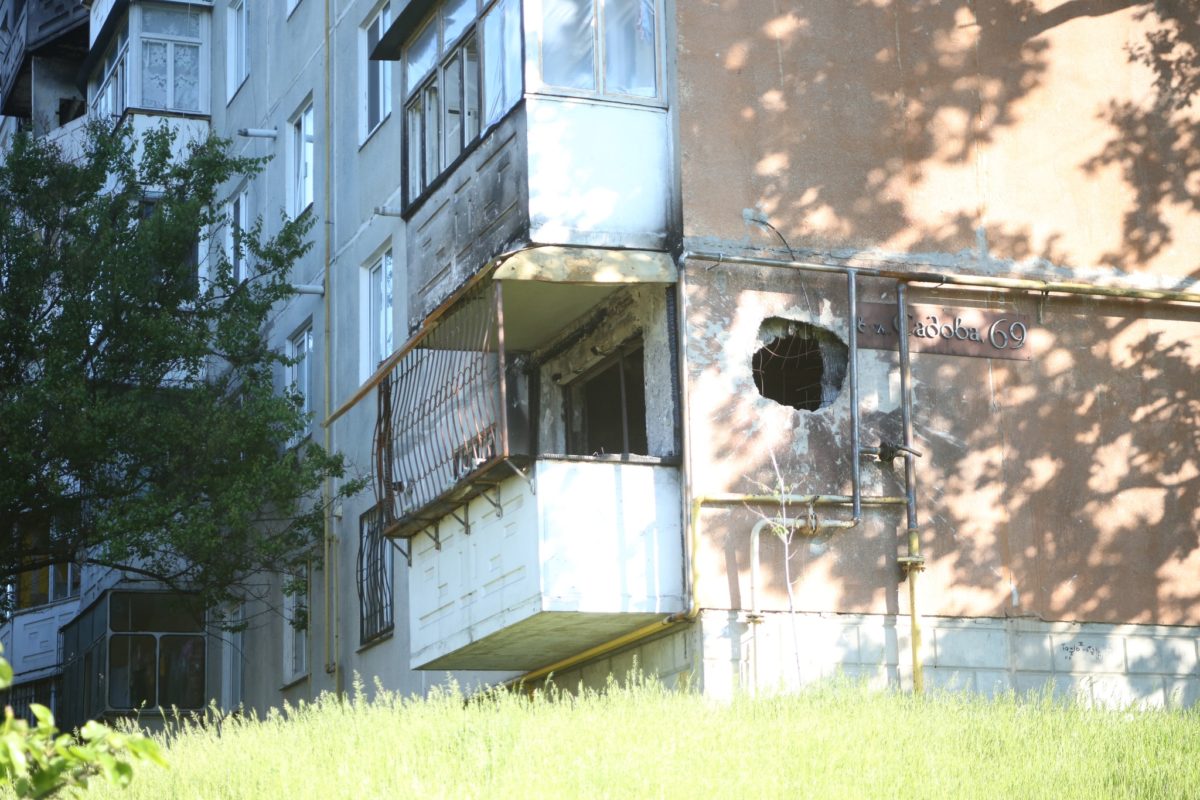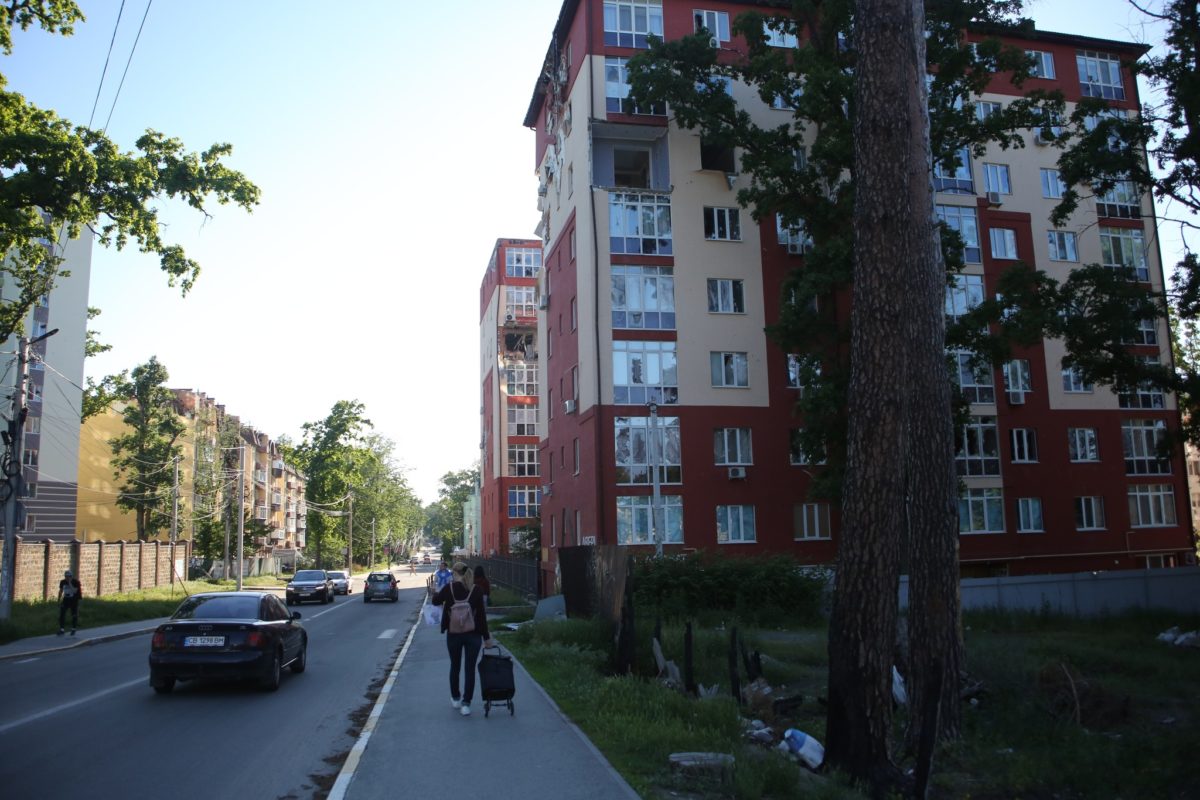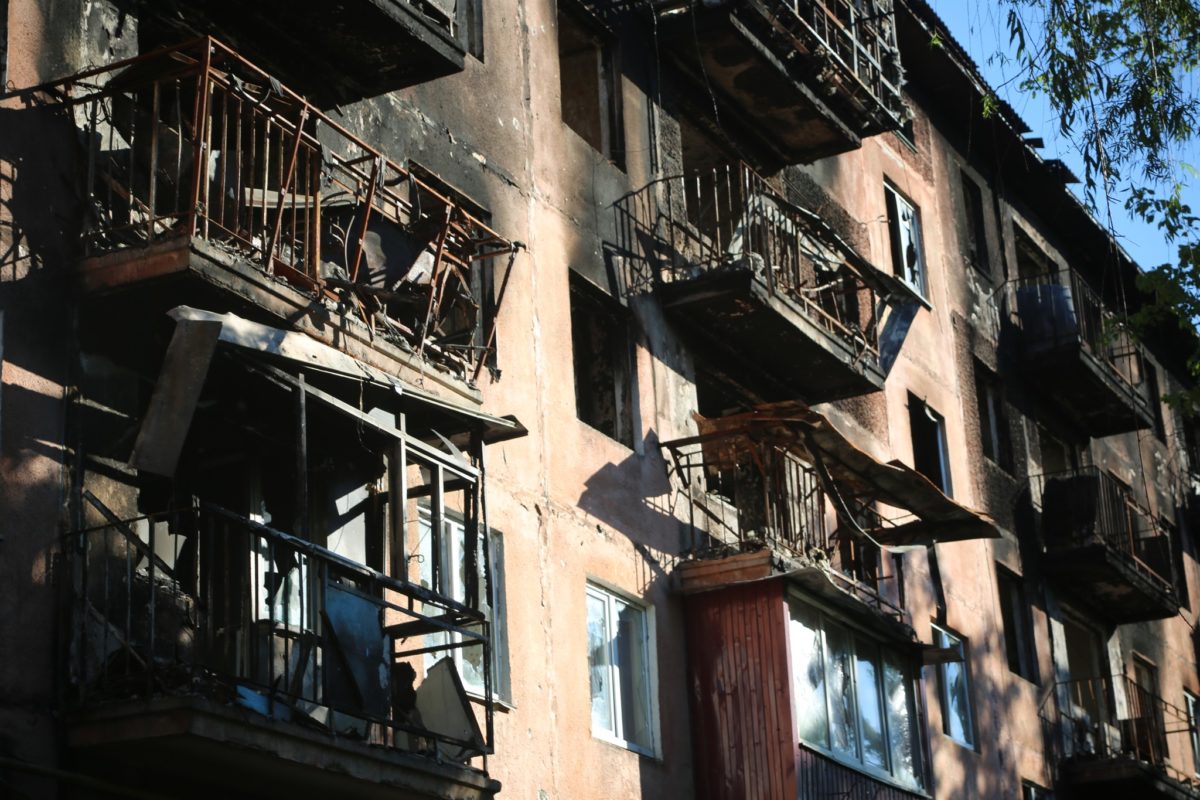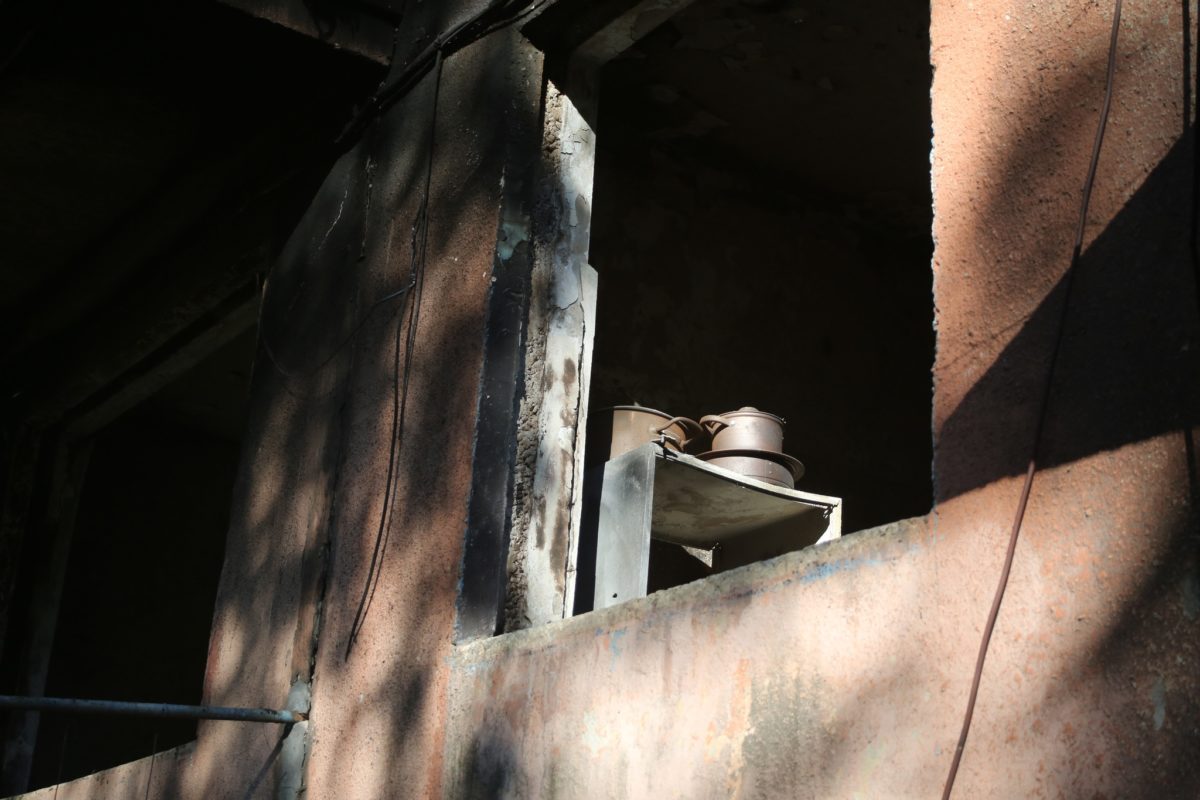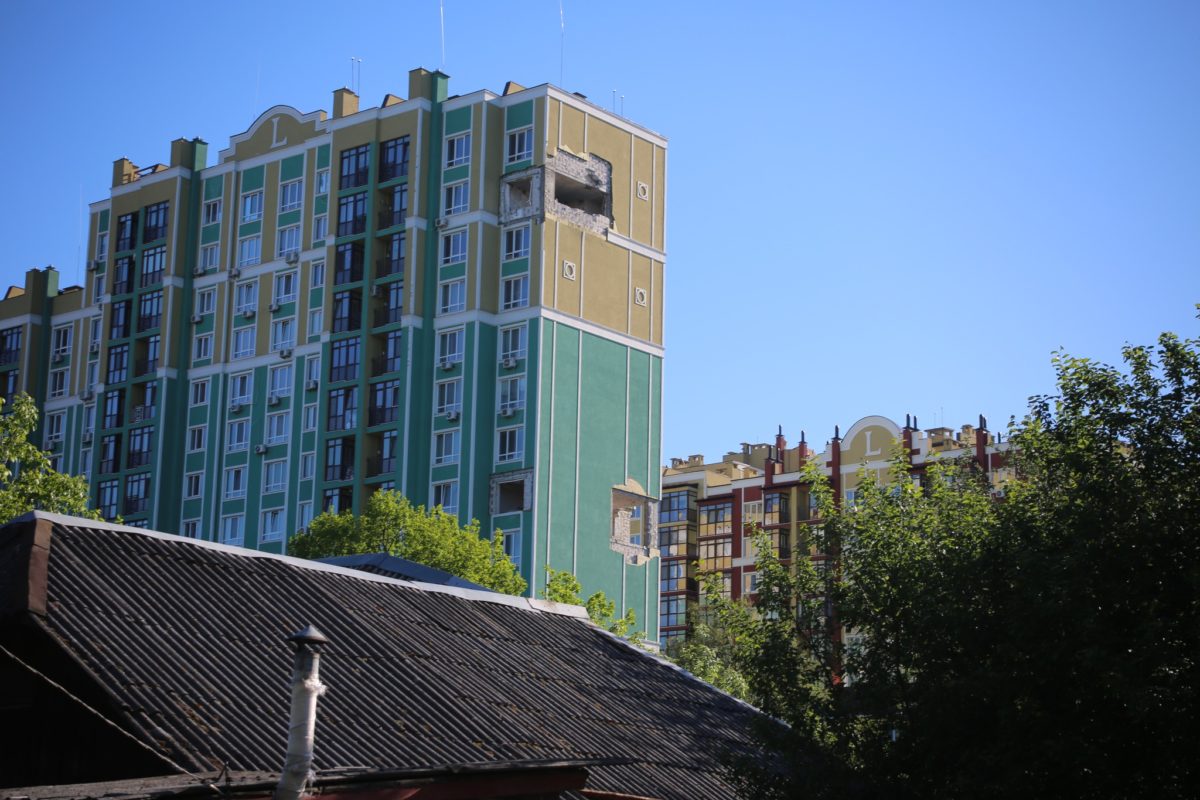Kyivans Anton and Andriy were late to sign up for the territorial defense when the Russian war on Ukraine began in February 2022, but they volunteered and evacuated hundreds of people from Irpin amid constant fighting. One day they were encircled in the besieged city, watching 'Kadyrovites' from the basement window. Another time they came under heavy mortar fire, they saw dozens of bullet-ridden cars and bodies of killed civilians and carried the wounded across the bridge.
Their story is an odd blend of thriller, comedy, and tragedy. It demonstrates how difficult and intuitive it is for the human psyche to adapt to constant threats to life, but it also shows the power of friendship and sacrifice.
We met with Andriy and Anton in late May 2022 while they were planning the next batch of humanitarian aid for Ukraine's east and south.
"The war has begun"
Anton awoke at 5:30 a.m. on February 24th to a phone call from his mother. "The war has started," she declared.
He and his wife Inna spent some time walking in circles in their Kyiv apartment. Then, in the distance, they heard explosions. Inna went to prepare their one-and-a-half-year-old son Mark for a trip, while Anton watched from the window as the opposite apartment building began to awaken: the windows lit up, and some people in the car park were loading up their cars and preparing to leave.
Except for Anton's military backpack, which he purchased after the war began in 2014, Anton and Inna were unprepared and had nothing packed and ready to go. However, Anton plotted possible escape routes for Inna and Mark from Kyiv three days before the invasion on a newly purchased paper map. "Why am I doing this?" he thought to himself as he drew.
When we met him three months later in a coffee shop in Kyiv, Anton recalled the difficult decision "to stay and pretend nothing is happening or leave." "When we decided to leave, I found myself mentally saying goodbye to closets, rooms, beds, and cacti," he says.
.
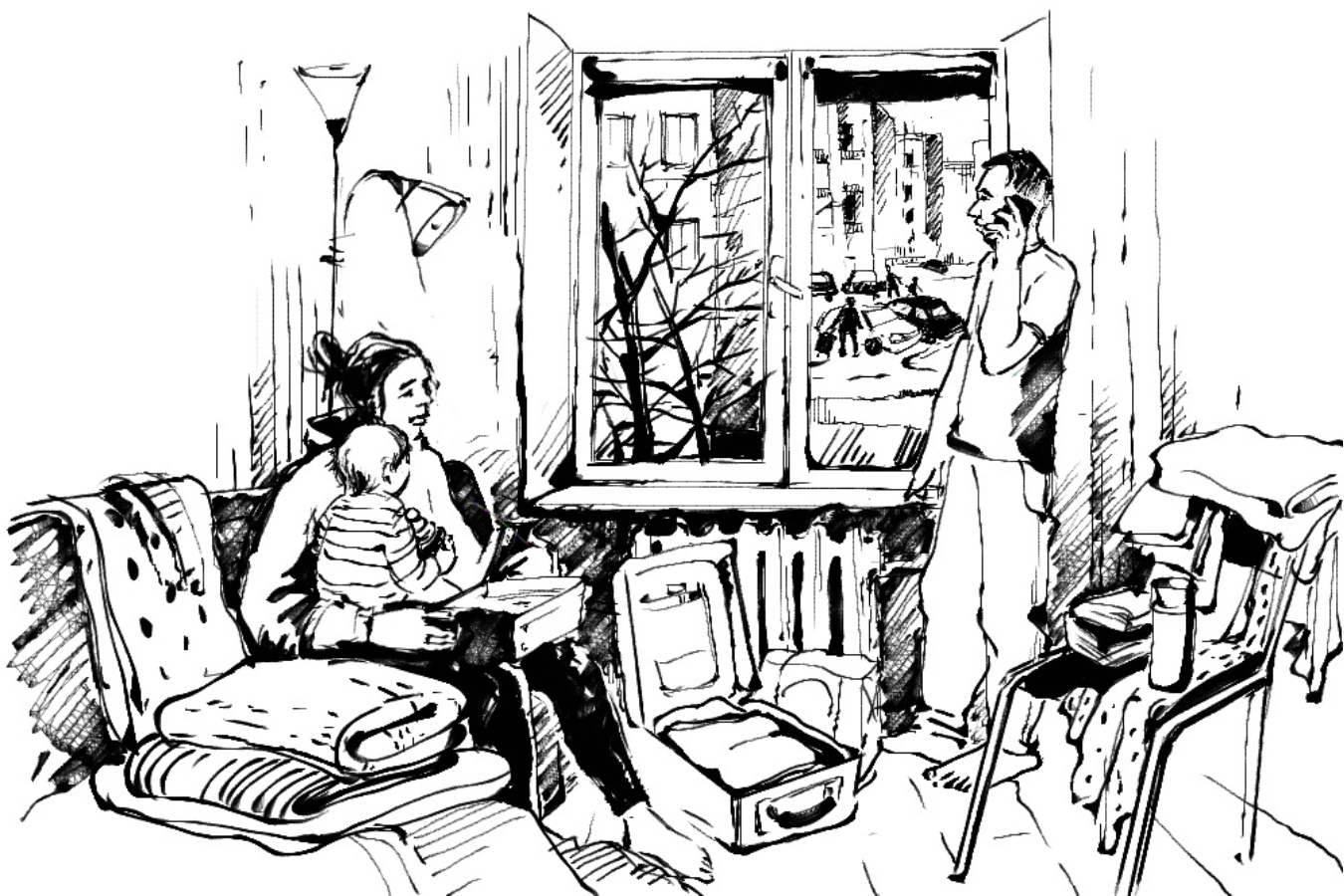
Anton had to go to work at the National Academy of Sciences' Institute of Physics that morning as a scientist. "I had a 'funny' feeling I should call the boss and ask for some time off," Anton laughs. So he called to say he wouldn’t be able to make it to work today. In this way, Anton’s curator realized the war had begun.
Anton, Inna, and little Mark had already left in the car, only two hours after being awakened. Due to the scarcity of gas stations on rural roads, Anton's habit of keeping fuel cans with 70 liters of fuel stuffed in the boot proved to be a godsend. Thousands of Kyiv residents joined Anton on these small roads that day. The family passed through Vasylkiv and Bila Tserkva, where smoke was rising from explosions. In the opposite lane, soldiers in military vehicles drove by, their faces tense.
The war began for Anton's friend, fitness trainer Andriy, in another apartment in Kyiv; they had been friends since the Euromaidan [Ukrainian Revolution in 2014]. "An explosion occurred. But I thought I may have misheard." Andriy reflects. He realized the war had begun when he heard his upstairs neighbors waking up. "I refused to accept it."
Oksana, Andriy's wife, and their three-year-old daughter were still sleeping. He quietly knelt beside his wife and whispered:
"Oksanochka, the war has begun."
"WHAT?" she shouted back.
"Stay calm; the war has begun; let's get up, drink some coffee, and make a plan. Daryna is still sleeping, so we have time to figure out what to do next."
Andriy had been ready for war long before this day had come. "I realized the Russians were not going to back down from our borders. It was only a matter of time before things spiraled out of control."
Andriy enlisted in the Kyiv territorial defense a few weeks before the 24th of February but only attended a couple of Saturday training sessions, which he describes as "very basic." Before the full-scale invasion, he read a useful article written by a spy that advised the best routes to take for fleeing Kyiv in the event of an attack.
Also, it factored in how much time they would have and how they might have to abandon vehicles and go further by foot. Andriy had called a friend in Hlevakha the day before and asked if it could be a meeting place for other family members. The friend said, "yes, of course. But I can't imagine what has to happen for a war to break out."
Russians wanted to capture Kyiv in three days. However, they were in for a surprise: tens of thousands of ordinary Kyivans picked up arms to save the day. We talk to Kyiv’s territorial defense about how Ukraine won the battle for Kyiv.https://t.co/UcFGyRRxbr
— Euromaidan Press (@EuromaidanPress) July 15, 2022
"Well..." groans Andriy.
Andriy and Oksana had already organized their clothes on the shelves so they would be easy to find in an attack. Andriy told his three-year-old daughter, "the adventures we talked about have begun. We were attacked by orcs."
The family did not flee within the first few hours of the attack. "We were paralyzed," Andriy says, "in the sense that you appear to be preparing, but you cannot fully prepare your psyche."
They left at 4 p.m. and drove for two nights without stopping. Finally, they slept for the first time in Zakarpattia, Ukraine's westernmost Oblast. Then they waited in line for 36 hours on the Slovakian border, with Andriy remaining by his family's side until the final goodbye. Anton was already waiting for Andriy in the western Ukrainian city of Lviv.
A Ukrainians duty: We will return to Kyiv
Sometimes I joke that if we lived in a peaceful world, we wouldn't have met because we have nothing in common
Anton called Andriy after evacuating his family and asked, "What are we going to do?". Anton told of his plans to return to Kyiv and, immediately, in response, heard: "Anton, wait for me."
They drove together from the western Lviv Oblast to the capital. "We got in the car, and our war began," Andriy explains.
"Sometimes I joke that if we lived in a peaceful world, we wouldn't have met because we have nothing in common," Anton says, recalling how they first met during Euromaidan.
They were driving on an empty lane, and a large stream of people from Kyiv was coming toward them. "We kept asking ourselves why we were going there, where we were going, and which [military] unit should we join." Anton reflects.
Suddenly, their car broke down. A tire fitter beside the road was closed, but the mechanics were inside. The men said they were going to Kyiv. "To Kyiv? Come in," the mechanics replied.
They didn't have any spare parts, so they wielded a new part out of scrap metal and fitted it. The car was later used to evacuate people in Kyiv and Irpin, but when a new part arrived, that car had already been destroyed.
"The closer we got to Kyiv, the more we realized that all the weapons [for territorial defense] were already there," Andriy recalls. "You'll just have to stand in line," Anton's friend, a territorial defense activist at the time, told him over the phone.
Nonetheless, he advised the men to volunteer at the Kryivka (hiding place of Ukrainian Insurgent Army left from the times of the World War II) Vilnyh (the Free) Foundation,, which assisted territorial defense units. "Don't try to learn something new. Do what you know well," the scout advised the same man about whom Andriy had read days before the war. In 2014-16, the men had a very successful volunteering experience, resolving many supply issues for the units in combat.
In the initial days, Anton and Andriy drove many of their colleagues' families to the train station; they also drove doctors to the hospital or servicemen to their units because public transportation was unavailable, and they delivered food kits to the vulnerable.
"Surrealism" in Irpin
On the 3rd of March, Anton and Andriy drove to Irpin for the first time with a group of volunteers in a convoy of private cars. They delivered food to the city and evacuated anyone who wanted to flee on the way back. Many people refused to leave Irpin at the time.
The men recalled how some houses had already been damaged at that time. "We looked around at the damaged buildings, deep in reflection... But we were part of a convoy. Other volunteers came there, and they were not afraid, so we assumed we were frightened for no reason," the men recalled. That day, under constant shelling, they took evacuees and returned to Kyiv intact.
Irpin, June 2022. Photos by Orysia Hrudka
"A convoy was reassembled on the 4th of March, but we were not allowed to enter Irpin due to fighting," Andriy explains.
"The main mistake we made the 5th of March was believing that the drivers in front of the convoy were aware of the situation and that everything was under control," Anton says after a brief pause. "However, this is untrue because the war changed every 5 minutes."
They took the same route as the 3rd of March. According to Anton, the Ukrainian military looked at the humanitarian convoy "wide-eyed but as if to say, 'okay, bring your humanitarian aid and leave ASAP.'" The first checkpoint, however, had been shelled by the 5th of March, and no one was left alive. Instead, there were bullet-riddled cars on the roadside with the words "Children" written on them.
"We pass them, as if in slow motion, but with the attitude of 'well, okay, we've got to drive further.'"
Andriy and Anton encountered "our boys" with Javelins pointing in the direction of the men, on the outskirts of Irpin.
"We're going where they expect an enemy to come from," Anton recalls. "As if in slow motion, I make eye contact with the soldier, and I understand through the look in his eyes what was going on... But the front cars had already passed, and we were in a convoy, so what could I do?" Anton recalls what went through his head.
"People were fleeing Irpin with their eyes wide open. Yet we were looking for a place to unload," Andriy explains.
"There was shelling somewhere, and a mother ran away with the baby pressed to her chest, squeezing him in, but it felt [ordinary]... You understand how the human psyche works in extreme situations after Irpin: it tries to pretend it isn't happening to you and that it can't be like that," Anton says.
"We are surrounded by the Russians. The entrance to Irpin is closed"
The convoy eventually arrived at the church, where a large shelter housed 200-250 people, including babies, children, and the elderly. Andriy and Anton unloaded all of the food they had and took to evacuate a couple in their car, an elderly lady and a two-year-old.
The first part of the convoy took people and moved from Irpin. However, a Russian tank appeared and shot the first civilian car. Then the volunteer drivers turned sharply, drove to the Romankivsky Bridge that was already blown up, abandoned their cars, and crossed the river on foot. The connection between the two parts of the convoy was torn. Meanwhile, Andriy and Anton's convoy had no idea what had happened and was returning. Anton was surprised to see the first civilian car in front of their section of the convoy turn sharply and head back. The massive bus, which was part of a convoy that day to evacuate more people, then made a sharp turn. "I knew something was wrong because the bus driver would never turn around like that on such a narrow road section."
The first car came close to Anton's.
"What's there?" Anton asks the driver
"There's a tank."
"A Russian one?"
"Well, not a f***ing Italian one!"
A Russian tank was parked only 400 meters away. The drivers and passengers of the convoy returned to the church. "That's all. The Irpin entrance has been completely sealed off. We've been encircled, "Anton and Andriy had been briefed.
Evacuees got off the bus and went to the shelter. Meanwhile, Andriy and Anton were dashing around the quarter, looking for other exits. Then came the first real shelling. Military medics in uniform and bulletproof vests took cover and collapsed on the ground nearby. "Get down! Lie down!" they yelled, realizing that shelling had begun, and instructed everyone to get to the basement. "Immediately!"
Final Farewells: Look after my love
"Andriy and I were initially together. When I looked at Andriukha [a friendly version of Andriy's name], he was completely silent. He usually says something, at the very least " Anton said with a smile.
"During Euromaidan," Andriy says. "There was also a tense atmosphere when we patrolled the streets. I realized at the time that everyone reacts differently to stressful situations. I fall completely silent. I'd prefer to say in a state of 'mobilization,' but that wasn't the case; rather, it was a state of 'shutdown.' Anton is always happy. I thought something was wrong with the guy at first, but then I realized it was his defensive reaction." Andriy beams.
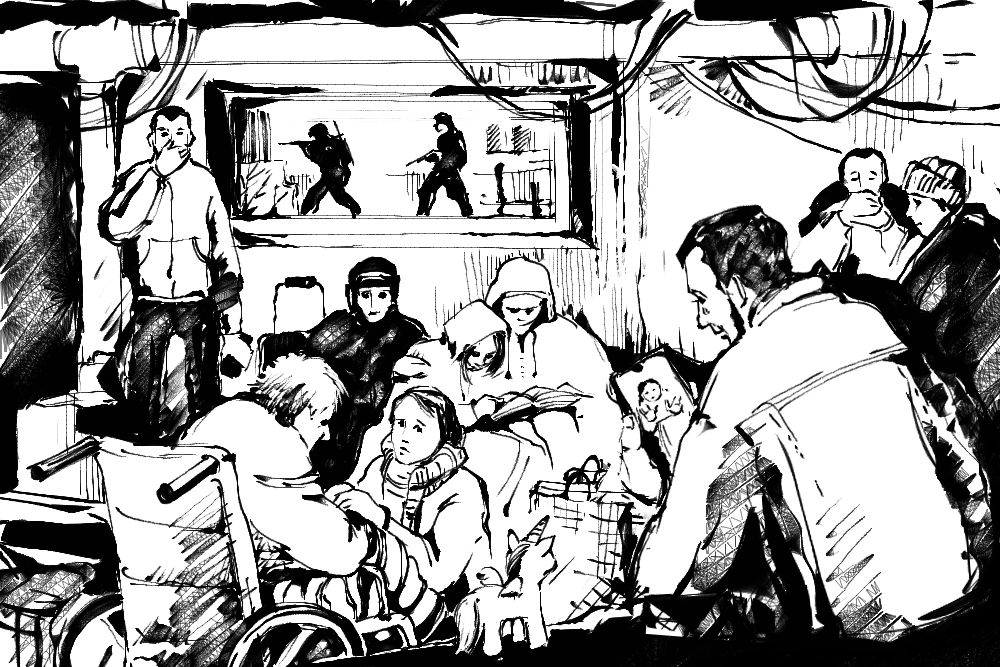
The shelter workers quickly closed the gates, pretending the building was empty, so the Russians wouldn't know anyone was there. "For some strange reason, I was still concerned that the car might get scratched." "And then, two hours later, a mine shell hit my car, and, well, I don't have to worry about it anymore," Anton smirks.
Anton was armed with a hunting rifle. Anton was advised by military medics not to bring it into the building, so he hid it in a nearby barn between "frequent shelling." Despite the chaos, he managed to keep his gun permit on him.
"I also ate." "Did you eat at the time?" Anton asks Andriy. He gave a nod. They were both thinking about the Borscht they shared with military medics. Despite the fact that the medics' cars had "huge crosses," Russians in armored personnel carriers continued to target them. The medics were aware of the situation: the checkpoint that had been holding back the Russians had been completely overrun, and Ukrainian defenders had been killed there. They talked about what they would do if the 'Kadyrovites' broke into the shelter. "It was like a scene from a movie: you're sitting on your couch, eating something, and they say, 'Well, if 'Kadyrovites' come in, we'll shoot them in the back with pistols, then use grenades.'" "I realized it was serious; it wasn't a movie, it wasn't a joke, and you were at a loss for words," Anton recalls.
"When the fighting stops in the morning, we’ll grab weapons from the corpses and continue to fight," the military medics said.
"They said it with such numbed intonation…
We were unprepared for this scenario - yesterday we delivered food kits, and today we'll be 'taking weapons from KIA and WIA' and fighting in a city we don't know anything about?" Andriy reflects.
Despite the lack of light, Andriy began to search the shelter's many rooms for places to hide. Meanwhile, Anton looked for escape routes. Andriy recalls, "He was still looking for a way out, and I was looking for a place to hide."
"Take care of my sweetheart," Andriy wrote to his relative. Anton was able to find a spot where he caught a decent mobile signal. "I'm in a difficult situation. Take care of Inna and Mark," he told his friend Yuriy.
https://twitter.com/EuromaidanPress/status/1516250432875728902?s=20&t=5nTSIenqbyx-qxTA7mOUug
"I'm not sure who was having a harder time at the time because I could tell from Yuriy's voice that it was hard for him. I barely got those words out. I was able to call my wife, tell her to stay strong, and take care of Mark," Anton says. Anton also wrote to a well-known volunteer and dropped the coordinates where they were, and she said she would try to arrange an evacuation route.
"Suddenly, people noticed that 'Kadyrovites' had entered their neighborhood, spotting them through the windows."
"We all instantly pulled back from the windows. Thank God they passed by, having considered the building empty. They were apparently mopping and cleaning up [looking for Ukrainian soldiers] because they had recently had a street fight with ours and were busy," Andriy explains.
"But the next step was clear: if they stayed there, they would begin checking the buildings and who these people were," Anton says.
They then went to Oksana. The men describe her as the bravest driver they've ever met. "At first glance, we noticed Oksana sitting completely carefree."
"No, not carefree, but frozen.," Anton continues. "Legs crossed. With a completely calm expression. We noticed she was shaking."
Oksana asked, "Messengers deleted?"
"No," they replied.
"Delete all messengers, including Facebook and Viber," she said slowly and calmly.
"On it!" exclaimed the men as they began deleting everything from their smartphones, leaving no trace that they had anything to do with Ukrainian resistance or volunteering. Instead, they had photos from their shooting practice from the previous week.
Oksana advised them to create a cover story legend about taking people out for money. "Say people promised to pay $2,000 but have yet to pay," Andriy says. "How experienced she is, we thought; this would never have occurred to us." Anton was still unsure what to do with his gun license.
"Put it beneath your heel. You'll have time to throw it away. It won't happen in a second," Oksana warned.
"We were fortunate to have such a good advisor," Andriy says.
Andriy found an empty corner and watched a video of his daughter before deleting everything that indicated their volunteer activity or pro-Ukrainian position from their phones.
"All we could do was wait, not knowing what to expect." "We planned for every possible scenario," he recalls.
Three unnerved Marines
A barrage of shelling began. It landed right on the church. "Get the hell out of here!" someone yelled. Anton told how his imagination ran wild and saw the room was on fire and that everyone would perish. Luckily, it was only in his head.
Anton dashed up to the first floor. He noticed a military man speaking with someone in the room. Upon catching sight of one another, they both yelled. The door was knocked off its hinges. On the street, two tense soldiers with machine guns guarded the perimeter. "It's the Russian soldiers," someone in the crowd shouted back.
Their uniform was truly unrecognizable, according to Anton. "Perhaps Russian soldiers had arrived and will now forcibly remove everyone," he reasoned at that point. Meanwhile, the soldiers yelled, "We are Ukrainian soldiers, and we have come to save you!"
Suddenly one of the men runs up to Anton and starts shaking him, shouting, "Anton, it's me!"
"Kostia?" Anton recognized the driver from the first leg of their convoy, which had left Irpin before the exit was forced shut. It turned out that they had been looking for someone to help them evacuate the stalled section of their column the entire time. They found three unnerved marines who agreed to assist them.
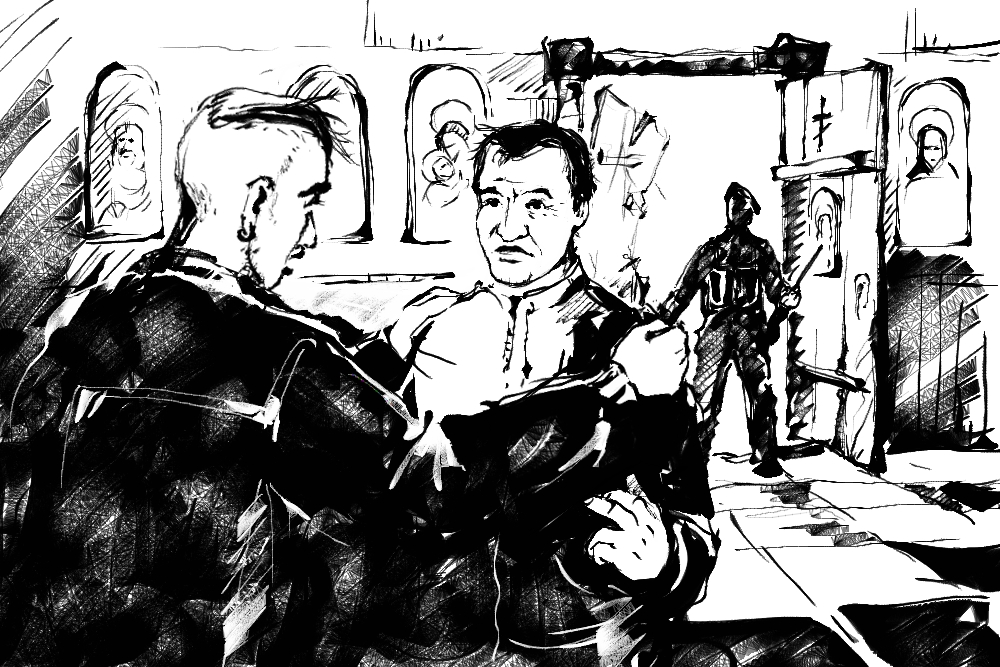
When Anton finally recognized it was Kostia, he shouted to the entire hall, "It's our troops!" The Marines also shouting: "Which of the cars work? Take the children and women, and leave! Get as many as possible out!" and "Ukraine's Marines. Evacuation," the men recall.
"Man, don't worry, your car was hit pretty good, but the engine should be okay," military medics said as they approached Anton
"As we quickly left the basement, we saw that all the buildings around us, all the private houses, were on fire..."
"Irpin was engulfed with smoke, and the Marines showed the moment when they were most needed. We were extremely happy to see them." "When they came in, it was like they were titans, but it turns out that they are just ordinary guys, our size, but absolutely fearless," Anton says.
People in the basement didn't trust the evacuation orders. "Everything was so unclear. I understood why they didn’t. People were wary. We were the only ones ready to leave. It was impossible to persuade the others at this point," Anton says, adding that, at this point, he began looking for Andriy, which he describes as "one of the most gut-wrenching moments of his life.
The convoy was already assembled, and the car engines started. The Marines called out the order, “okay, go,” I shouted back.
"Andriy was at this point tied up, trying to explain to the bus driver that we needed to go, an evacuation was their way out of this hell alive. People have to get in," Andriy continues Anton's story. "I explained to the driver, but he refused. Undoubtedly scared.”
When the men fled Irpin, it was already dark. Anton was driving at 120-130 km/h in order to keep up with the Marines' convoy. The Romankivskyi Bridge was clogged with abandoned vehicles, and the men realized they'd have to park up. There was no way they could cross by car. They noticed a bridge not far from them that had previously been destroyed.
They walked under the bridge in the dark and arrived in Kyiv, where the Security Service (SBU) was waiting for them. Due to the newly instated curfew, The SBU escorted them to the metro station with the assistance of a soldier from the territorial defense. They planned to spend the night at the metro to honor the curfew, but the police offered to take them home.
No man shall be left behind
After the shelling, the men suffered a minor concussion lasting around three days. Despite a severe headache, Anton posted on social media on the evening of the 5th of March, "Friends, our cars have been destroyed, so we will no longer be able to carry out humanitarian missions."
Anton didn't sleep that night, kept awake by the influx of messages he was receiving. Throughout the night, his Facebook friends found three cars for them to use so they could continue their mission.
The next day at 8:30, the men took the first new car and went to Romanivka to the ruined bridge. "We left people there with whom we had exchanged phone numbers. We couldn’t stop thinking about them."
Executed fleeing civilians who tried to flee, surviving thanks to saved cows, and looted homes: the sleepy village of Mykulychi, where Russians set up a base for attacking the nearby towns of Hostomel, Irpin & Bucha, recalls its month of occupationhttps://t.co/H8yPDHKMWn
— Euromaidan Press (@EuromaidanPress) April 14, 2022
Although some people had been evacuated, hundreds remained in the shelter the men managed to escape from the day before. While driving, they heard news about how a shell mine had exploded near Oksana. She had left for Irpin a little earlier, and her husband had taken a nasty injury in the thigh. "But we were not phased. We continued towards Irpin. We turned a blind eye to the fact that a shell mine had struck our colleague's car, for those moments at least. It happens [we then thought], we have to keep going," Anton says.
The men reached Romanivka by walking in a ditch alongside the road for the last few kilometers; after hearing the sound of a machine gun firing, they parked further away. Their car, which they used to escape with the marines yesterday, was slightly damaged but still operable. Unlike the volunteers' cars who parked closer to Irpin, which had been burnt to the ground.
Anton ripped a piece of fence wire and tied it to the muffler. "Feeling guilty I remember thinking, 'Well, I'll just take a little piece and return it when I can.'"
In the days that followed, the men took antifreeze from Kyiv because the engine was damaged, then took fuel, and wheels, constantly being damaged from the torn-up roads.
Irpin was under complete occupation for only one day on the 5th March, Anton says. The Ukrainian military constantly pushed the Russians back, so Irpin was constantly changing hands, but generally, there were always three zones. Ukrainian troops controlled one-third, Russians controlled another third, and another third was a gray area. "Those [volunteer drivers] who went to Russian-controlled territory are no longer alive," Anton says.
“You’ve always been my helping hand”. Daughter of a Bucha victim helps orphans to cope with trauma
In addition to evacuating people from the shelter, Anton began to receive requests on Facebook to pick up people from other places in Irpin. So Anton became the driver, and Andriy was the planner and address manager.
On his phone, Andriy shows a list of hundreds of addresses. Most of the lines are crossed out. These are the residents whom Andriy and Anton evacuated. "We started asking some personal details about the people we were asked to evacuate because many of them initially didn't trust us enough to go when we got to them," says Andriy. There was no mobile connection in Irpin.
"One day, we carried over the bridge a 20-year-old girl, Katia, who moved from Crimea to Irpin eight years ago. She was driving towards Hostomel; Russians shot at her car, marked with huge red crosses and the inscription "volunteers". Katia suffered 5 bullet wounds; her ribs were hit, and her leg was shot. We carried her over the Romaniv bridge, walking 200 meters under constant shelling", Andriy recalls.
The evacuation consisted of three parts: from Irpin to the Romaniv bridge, crossing the bridge, and from there to Kyiv. The two friends worked in all possible ways. First, Anton and Andriy helped build a platform out of boards over the Irpin river with other volunteers and the Armed Forces. Before that, everyone just crossed the river through the water. This was all while the Russians were shelling big buses carrying people from the bridge to Kyiv, so the mission was one of quick work. The buses had to drive at high speed to survive.
When they got to Kyiv, the men told how people cried, not believing they escaped this horror. They had a truck that could take in "everyone and everything": people with cats, dogs, bicycles. "Some went out only with a passport, and some dragged in enough bags to contain their entire lives."
"Leaving was also a risk," Andriy says. "On the 7th of March, when we approached Romanivka and wanted to evacuate people, a shell landed directly into the car of the family that tried to evacuate. We saw children's bodies covered with white sheets. Nobody who got into our car was sure they were safe."
Four volunteers who were delivering food to Bucha, a Kyiv suburb where mass Russian atrocities took place, were shot dead by the Russians, Anton says. The approaches to the city were littered with shelled cars, their killed owners inside. And in Irpin, the guys saw a car of volunteers with red crosses on it, destroyed by shelling. "The driver was buried next to the car," Anton says.
(Tetiana was one of those Irpin residents who stayed in Irpin during the hostilities and had her houses bombed and burned to the ground. Today she lives in a garage but doesn't want to leave her home. Watch exclusive footage:
"You are just whipping up panic"
"It was mentally trying. Irpin changed for the worse day by day. The harder it got, the less people were willing to leave," Anton recalls.
"We had already singled out districts based on different reactions of people. In one, for example, people said, 'You are just whipping up panic' when we approached to pick them up. They were already preparing food on fires outside but said that they had already been shelled and 'the projectile would not hit the same funnel twice.'" The guys tried to persuade them to leave while there was still a chance. "Those people were in their house and didn't see anything, while we went around the city and saw that only bare walls were left in areas with fighting. We tried to explain this," Anton adds.
The fighting in that area of Irpin commenced quickly. In more than two weeks, when volunteer evacuators finally got there, they saw that the house where people refused to leave was completely burnt down, and the garages nearby were completely destroyed.
The Ukrainian city of Irpin, before and after the Russian world#RussianWarCrimes pic.twitter.com/sKQKLoHSMq
— Euromaidan Press (@EuromaidanPress) April 16, 2022
"Next to them was a man who looked 65 years old but was, in fact, only 32. He laid there with frostbitten legs. He lived in a garage after his house was demolished, and then a tank came and fired on the garages too," Andriy says.
"In the yard, where people said 'You are just whipping up panic,' a woman was killed after a tank shelled the house," Anton says.
Another time, the men needed a bigger car when they saw a badly injured boy on the street, "probably the only person we refused to evacuate in our car," Andriy says. "Because when I approach him, he throws away the half-burnt tarpaulin under which he was lying. I look at these legs, sniff and pull away due to the stench of charcoaled flesh, barely restraining myself and saying:
'Anton, I won't take him out.'
I just could not do it physically, because I felt sick. I knew I would have vomited while driving."
Andriy told the sick boy, "We will definitely take you out, but now we need to find a bigger car."
Nearby there was a car of the Red Cross, "which travels only when it is already relatively safe," Anton says. After Anton approached it, he saw "a frightened driver."
"I started explaining that I was very happy to see them and that there is work for them, exactly for them, because we didn't have a car big enough. So we showed them where to go.
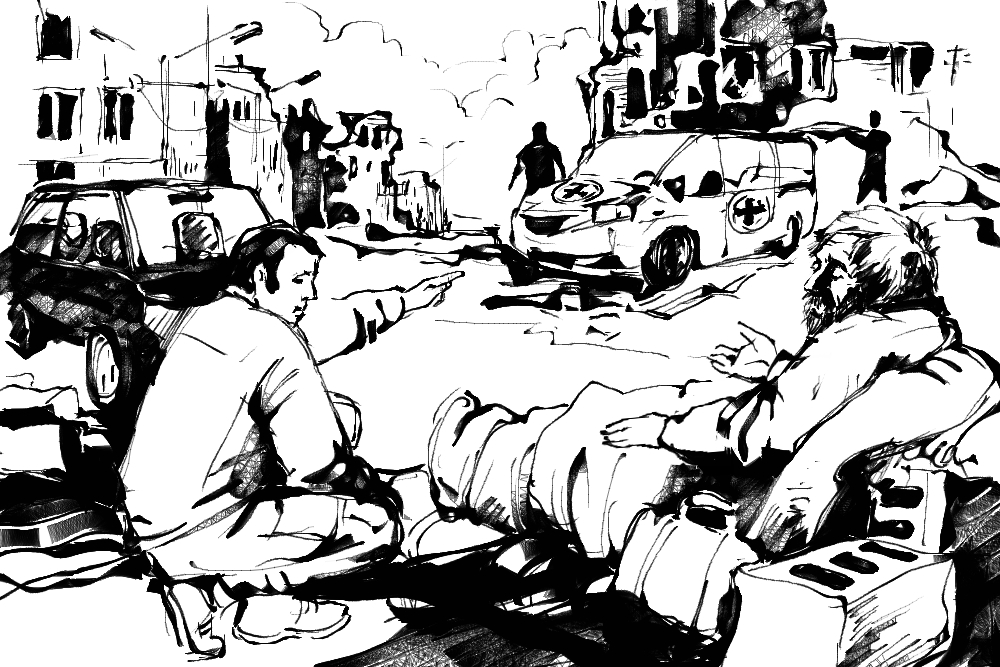
The smells of war are something that stuck with the two men.
We saw what a city without water and sewage turns into after just a few days of war
"We saw what a city without water and sewage turns into after just a few days of war. It's terrible. People just took out their feces to the entrances of the apartment buildings and left them there," Anton says
Several times a day, Andriy and Anton had to take cover under shellfire. "You can't be lazy when it whistles – you need to drop to the floor. Sometimes it does not explode. Sometimes you fall like an old house eroding away, and your knees and arms get all scuffed up, but taking cover is a must," Andriy recalls.
The further from the fighting, the scarier it is
"People view the fighting very differently depending on the distance from the hotspot," Anton says. "To get to Irpin itself, we needed to pass four checkpoints. The territorial defense stood at the first checkpoint. We approached and asked what the situation was in Irpin, and they said, 'Oh dear, so much shelling, it's so dangerous there.' The second checkpoint was held by the police. 'Put on your helmets and drive those seven miles fast,' they told us. At the third, Marines told us how often it hit and where. And at the "zero" checkpoint, the closest one to the fighting zone, it was 'half an hour ago there was so-and-so many hits. The result – minus so many [of the enemy], we also lost two KIA, and 3 WIA. Nothing has changed in that area.'"
Andriy and Anton found out all they needed to know about the situation ahead. "After crossing the bridge, we greeted everyone we met, asking about the situation in Irpin. 'You mustn't go there under any circumstances, we were told. When we asked about a particular address, we could hear, 'Well, you can try, but be careful'. We shook hands and drove on. Every time we saw a car coming in the oncoming direction, we slowed down so we could ask every driver how the situation was changing."
Irpin, June 2022. Photos by Orysia Hrudka
In war, every second counts: Grandads refusal to leave without his blue insulating tape
In the end, Anton and Andriy were able to reach the addresses that had been sitting on the list for quite a time, the Synerhiya residential complex. This was where, for 32 days, Irpin residents lived under Russian occupation. Their first task was to pick up a woman with two children.
Andry and Anton went down to the first address's basement and shouted to see if anyone was home. "Silence. And then someone cautiously asks, 'Are you ours?' And then it turned out there were dozens of people in this basement, not just three. They sat there for 32 days during the occupation whilst the Russians looted and lived in their apartments."
Other driver volunteers helped evacuate everyone from that basement, but more people were hiding nearby. Finally, Anton and Andriy returned to pick up the woman and an elderly couple. But the couple spent a very long time packing.
“They killed my family in cold blood!” Russian military targets civilians fleeing bombardments
"They lost their sense of urgency due to a quiet period of no shelling. It rained and stopped, and the sun came out. There was silence, and, though bombed out, a calm and quiet city remained. It was perhaps the first time we walked in this area almost fully upright: before that, our shoulders were always hunched, creeping around the city," Andriy recalls.
While the old man was packing, the men saw how the process was taking longer than expected, all because he was adamant he needed his blue tape and a tape measure.
"It's a very difficult moment when evacuating people, not to yell at them loudly and say that people are dying and, by collecting things, you are taking time away from those who are also in line for evacuation. Sit down and leave, things don't matter! But it was very difficult to explain; all he was looking for was blue insulating tape."
"I could no longer stand the awful smells and decided to wait on the street." Andriy recalls. "On the street, I saw two of our colleagues [volunteer drivers] and showed them another basement with people, and gathered a bunch of evacuees who were already sniffing the sweet smell of freedom, while walking to our car.
And suddenly, they [Russian troops] started firing shells. I squeezed into the asphalt, where there was a ten-centimetre layer of broken bricks and glass. And the shells above us flew to the house where Anton was."
"And at this time, I'm helping this grandfather who strolls leisurely out of his flat. But with the blue tape and tape measure in hand. All good," Anton says sarcastically.
Anton sat the old couple down in the car, where a woman had already waited. "And at that moment, the first shell struck – not like it usually did above our heads, but crashing into a garage nearby. As did the woman, I fell to the ground, but the elderly couple couldn't get out of the car alone." Anton realized that it was time to go. There was no mobile connection in the city, yet he managed to call Andriy on a walkie-talkie, which an Irpin resident gave him along with the car.
"There's shelling. We have to leave."
"Okay, go!" he heard from Andriy in response. "I will not go without you, come! I'll pick you up near the burned tap station."
Among the wreckage, Andriy ran in armor weighing 12 kilogram towards Anton. "Andriy was running, as shells exploded behind him. Just how it is in a Hollywood action movie. And then I looked at the passengers, and they sat there pale as death. "Some rescue," they probably thought. Andriy jumped in the car as another volunteer driving a Skoda shows up and asks where he can find people for evacuation: he had not seen any and would not leave with an empty car.”
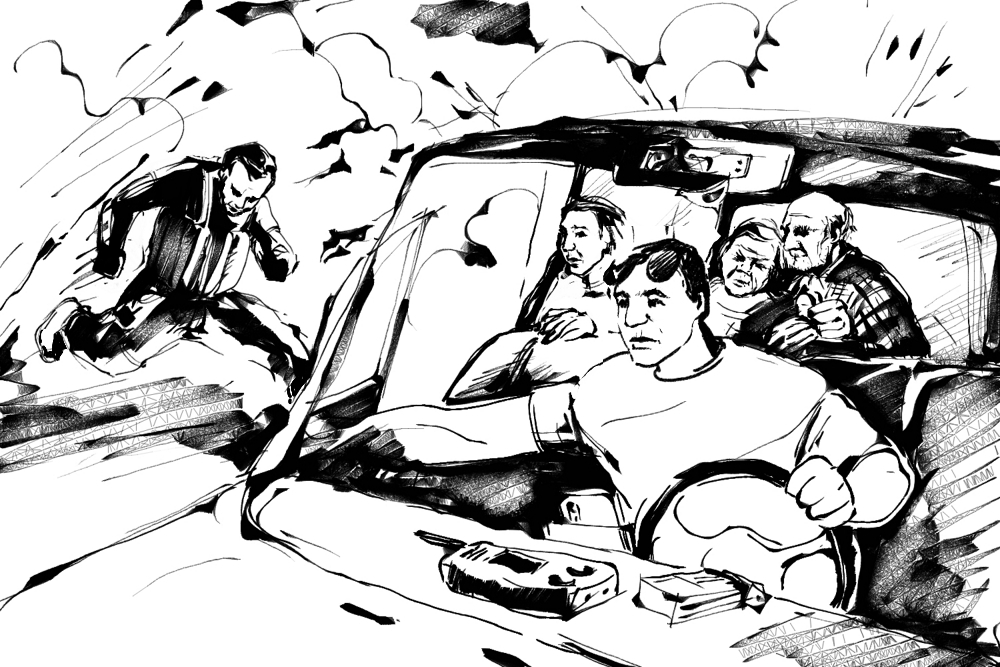
In the following days, the two friends entered Bucha, saw corpses lying on the street, talked to the locals and heard stories of how the Russians executed all the territorial defense and all the security guards of one of the enterprises.
"Surprising us was no easy feat as we had already met so many people and heard their stories. If the stories were really quite unsettling, we took those people to the police so they could be told there. When you hear these king of stories for the first or second time, you can't believe it, but after it becomes a conveyor belt of horrible stories that no sick imagination can invent, you become abstract from it. One of our friends listened to all these stories in detail and documented everything. After that, she was in a state of shock and she herself needed to see a psychologist.”
When you hear these king of stories for the first or second time, you can't believe it, but after it becomes a conveyor belt of horrible stories that no sick imagination can invent, you become abstract from it
"When Irpin was liberated, we had a new crisis we had to deal with: Now what? What should we do? How do we adapt? It was a very difficult three days emotionally." Andriy says.
When the men arrived in Romanivka and parked the car, the shelling of the town began. They began ferrying people across the river, rushing because a missile had already landed at the crossing point, severely injuring a woman's spine: "If a [missile] whistles, you fall, you run, it explodes, you get up, you run again."
Russian propagandists should be put on “Bucha List” for inciting genocide – Ukrainian MP
You can expect anything form Russians: No safe place in Ukraine
The men brought a jeep to Kharkiv for Serhiy Zhadan, a famous Ukrainian writer who wrote about the war and now fundraises to support the army). When we talked to Anton and Andriy, they were planning their next trip to the south of Ukraine.
After three months of the invasion, Anton has "forced himself" to give lectures to students. "It's hard to adjust because it all seems strange. "A mere fragile little paper and a what you wish to be untrue series of events," he says. "I understand the troops returning from the front line to civilian life. It's difficult psychologically to return to a peaceful life. So why am I doing this, you ask yourself?
[bctt tweet="I miss my son and wife very much. I haven't seen my child for 3 months. It's horrible" username="Euromaidanpress"]
Every morning, I asked myself this question, on the road to the then occupied Irpin: the answer was because I understood what needed to be done. I face the same challenge while giving the lectures, just the other way around.
"I miss my son and wife very much. I haven't seen my child for 3 months. It's horrible," Anton tells about his family who evacuated abroad. "As it stands, I don't think the situation is safe enough for them to return. Andriy and I have gas masks. We understand one thing: you can expect anything from the Russians."
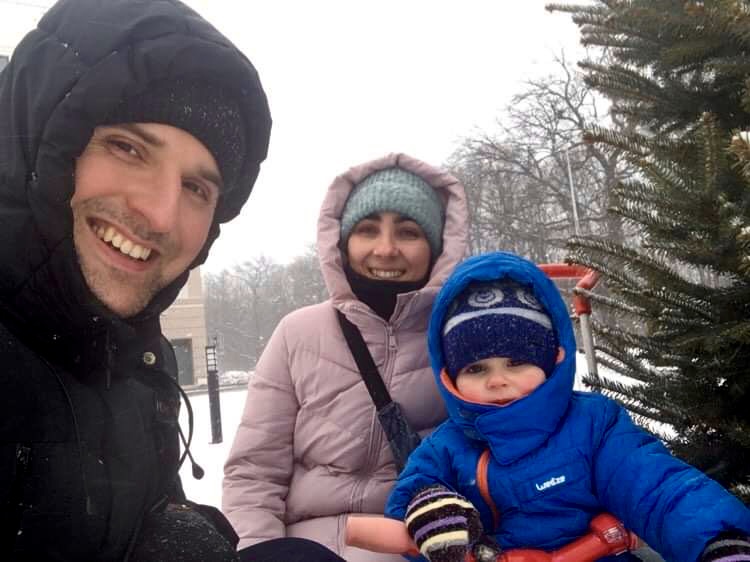
"As time passed, I slowly learned how to erase those awful memories. I understand this won't end in a month, and the faster we, as a society, can adjust to a long-term war, the easier it will be for us. My Facebook feed now is full of obituaries. You understand that people are dying. So we must continue preparing for hostilities and be able to provide first aid. The struggle continues, and it's not over yet. We need to deal with it more dispassionately, in a balanced way and appreciate every resource – whether a litre of fuel or a thermal imager," Andriy says.
The hardest thing is to explain to the kids, "to those who did not see, but only heard a little, that all this is no joke," Anton says. "It will be hardest for the soldiers. There is an invisible wall between those whose closest war experience is through a TV and those who have seen it up close and personal."
Lessons of War: They started it. We will finish it.
"War teaches us not to put off living. It's amazing to see how often people waste their lives. The Ukrainian military won back minutes for us because there was a time when it was impossible to plan our lives even a minute ahead, and plans to meet next Thursday were bizarre because you didn't know if you would be alive next Thursday. In every battle, our military buys us minutes so that, for example, we could schedule this interview and do all those normal things. Hug your son, wife, or daughter, do not put it off. Now that my wife and son are very far away, I understand how many moments I could have had but lost."
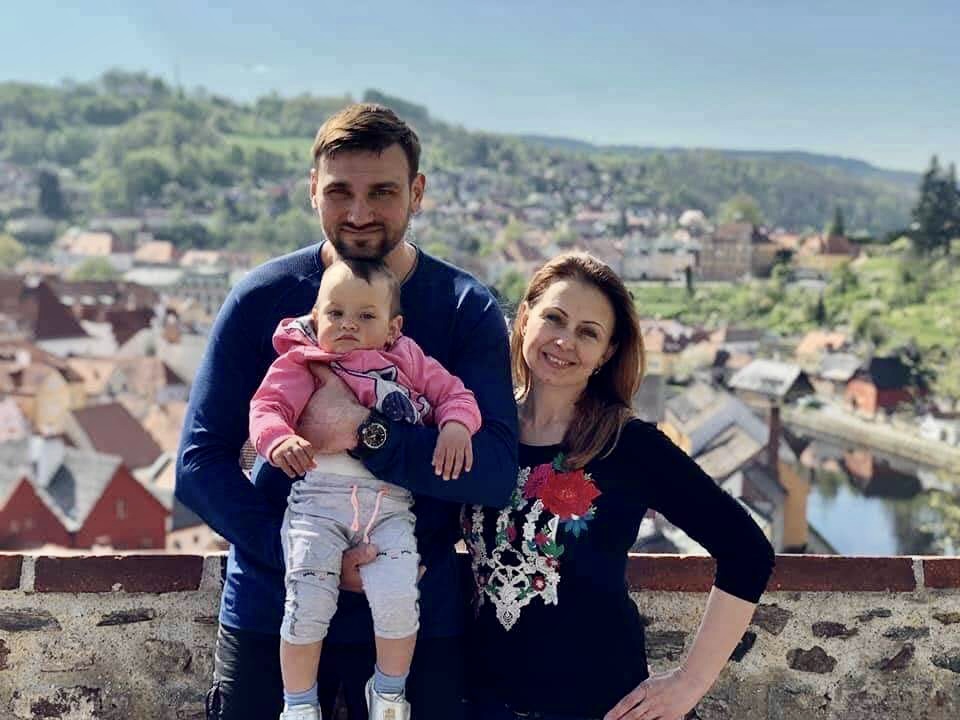
When asked how Anton foresees a Ukraine post-Russian war, Anton said he remains pessimistic, citing his fears that politicians will exploit their positions of power and the war to make themselves national heroes.
"Right now, the most important thing for the country is to hang on, to survive. All public activists and reformers either hold the front lines or support the volunteer front.”
“A future of a stronger, more prosperous Ukraine will not come by us sitting on idle hands. Even after the war, our battle against Russian influence will continue, as will the battle to remove all Russian thieves from the deep roots of our governmental structures. The war has only sped up the process. It has already started. So let's not miss this opportunity to free ourselves from their greed and complete the job we have long sought to finish.”
“There was a new outlook for our future after the Maidan, before we were left with the disappointing feeling that nothing had changed. But if these post-Maidan changes hadn't occurred, the situation today would have taken a very different turn; they saved us." Putin believed that nothing had changed and that his tanks would be met with flowers. No one was met with flowers, and I can only imagine how shocked the Russian soldiers were when they learned of their fate. They thought they would quickly proceed to a victory parade, but their tanks got a welcome of a different calibre.”

“We've already won, but the question now is how many more people must die to ensure our victory. We're doing this so that our children don't suffer the same fate as our ancestors and us," Anton explains.
Anton and Andriy were convinced that Russia was not done with Ukraine after the Euromaidan Revolution in February 2014 and a three-month standoff with pro-Russian president Viktor Yanukovych's forces.
"When the Heavenly Hundred were laid to rest, we patrolled the streets, placing candles at every crossroads as people rejoiced that it was all over. We, on the other hand, were convinced that this was only the beginning.”
“As it turned out, it really was."
Related
- How a Ukrainian paramedic team trains volunteers to save wounded soldiers on the frontline
- Created in three days, Ukraine’s territorial defense ruined Russian plans to capture Kyiv
- “My name was on Russia’s kill lists,” Mariupol journalist who joined territorial defense says
- How to join Ukraine’s Foreign Legion of Territorial Defense
- How Ukraine is building its territorial defense: results of first month
- Russian propagandists should be put on “Bucha List” for inciting genocide – Ukrainian MP
- “You’ve always been my helping hand”. Daughter of a Bucha victim helps orphans to cope with traum
- Bucha: a turning point–not only in Putin’s war in Ukraine, but in relations between Moscow and the world
- Russia’s shelling of Irpin apartment complex to be submitted to International Criminal Court



